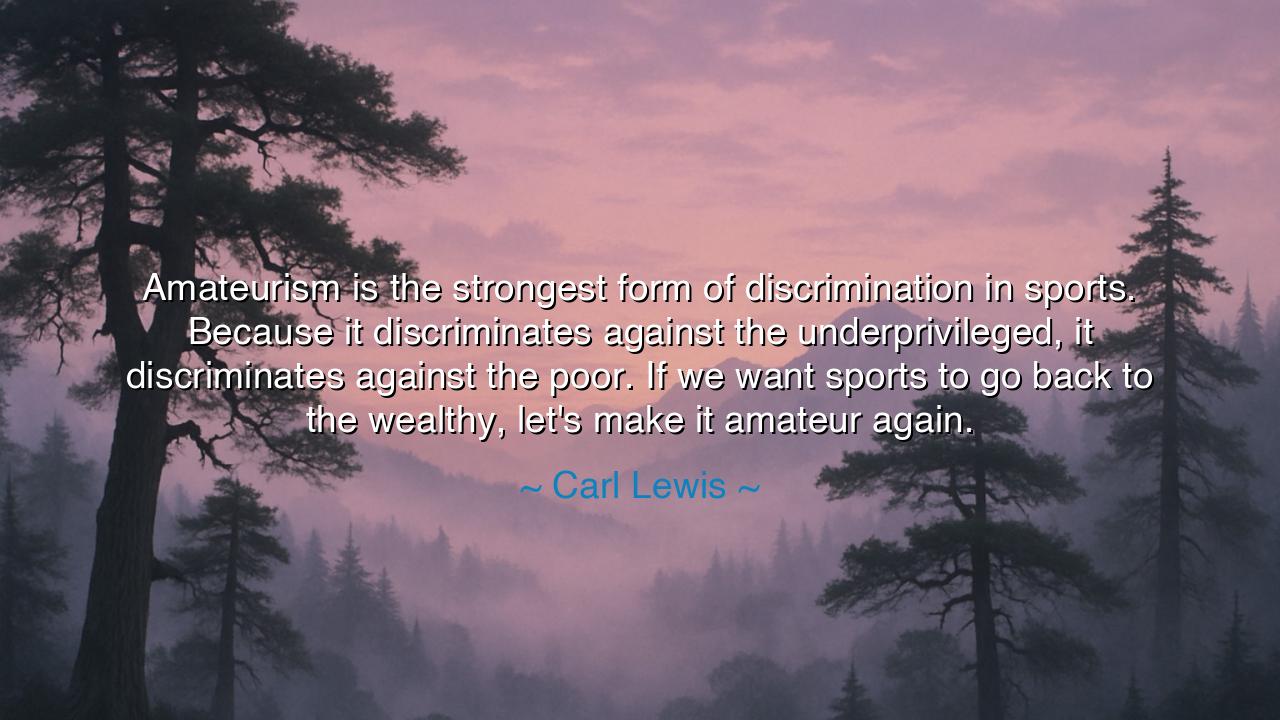
Amateurism is the strongest form of discrimination in sports.
Amateurism is the strongest form of discrimination in sports. Because it discriminates against the underprivileged, it discriminates against the poor. If we want sports to go back to the wealthy, let's make it amateur again.






The words of Carl Lewis strike with the force of both truth and rebellion: “Amateurism is the strongest form of discrimination in sports. Because it discriminates against the underprivileged, it discriminates against the poor. If we want sports to go back to the wealthy, let’s make it amateur again.” In this declaration lies not merely a critique of policy, but a timeless reminder that the playing field is never level until opportunity is granted to all, regardless of wealth or station. For in the name of “amateurism,” the poor have long been barred from the chance to rise through their gifts.
He begins with the charge that amateurism is discrimination. To the unthinking ear, amateurism sounds noble, a return to purity, competition for its own sake. But Lewis unmasks it: for when athletes are denied pay, only those with wealth can afford to train, to travel, to dedicate their lives to excellence. The poor must work to survive, and thus their talents wither unseen. Amateurism, far from elevating the spirit of sport, becomes a gatekeeper, locking the underprivileged out of the arena.
The origin of this injustice lies deep in history. In the 19th century, when the modern Olympics were reborn, amateurism was enshrined as a guiding principle. But this was not a principle of fairness; it was a weapon of exclusion. The wealthy, who had the leisure to train without pay, declared that earning money from sport was dishonorable. Thus, laborers, farmhands, and the working class were pushed aside, deemed unworthy. The myth of purity concealed the truth of privilege.
History bears witness to this cruelty. Consider Jim Thorpe, the Native American athlete who, in 1912, astonished the world by winning gold in both the decathlon and pentathlon. Yet when it was revealed he had once received a small payment for playing baseball, his medals were stripped from him. His crime was poverty; he had taken wages to survive. The wealthy could play freely, but Thorpe, born into hardship, was punished for the same. This was amateurism at its cruelest—upholding not virtue, but class division.
Carl Lewis, himself a child of discipline and determination, knew this history and lived its shadow. By declaring that amateurism returns sport to the wealthy, he spoke against the old lie that competition must be unpaid to be pure. He insisted instead that fairness demands access, and access requires resources. Only when athletes of every class are supported—through sponsorships, scholarships, or pay—can the field truly be level, and the spirit of sport realized in its fullest form.
The lesson is clear: do not be deceived by lofty words that hide inequality. Purity of sport does not come from excluding the poor; it comes from including all who have the heart, the will, and the courage to compete. Discrimination often wears the mask of tradition, but the wise must pierce the mask and see the truth beneath.
Therefore, children of the future, learn this teaching: opportunity must not be chained to wealth. If sport is to unite rather than divide, if it is to serve as the great equalizer, then it must welcome the underprivileged, not shut them out. Support the poor, empower the overlooked, and break down the barriers of class, for only then will the contest be true.
Thus, Carl Lewis’s words endure not merely as a protest, but as a commandment: tear down the false walls of amateurism, and let the gates of sport stand open to all. For greatness is not born in wealth, but in the fire of the human spirit—and if that fire is nurtured in every soul, then the games of men and women will shine with a brilliance that belongs not to the few, but to all.






AAdministratorAdministrator
Welcome, honored guests. Please leave a comment, we will respond soon